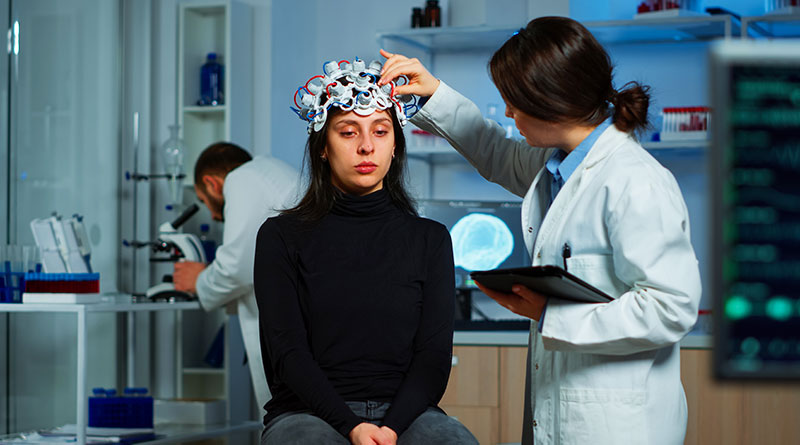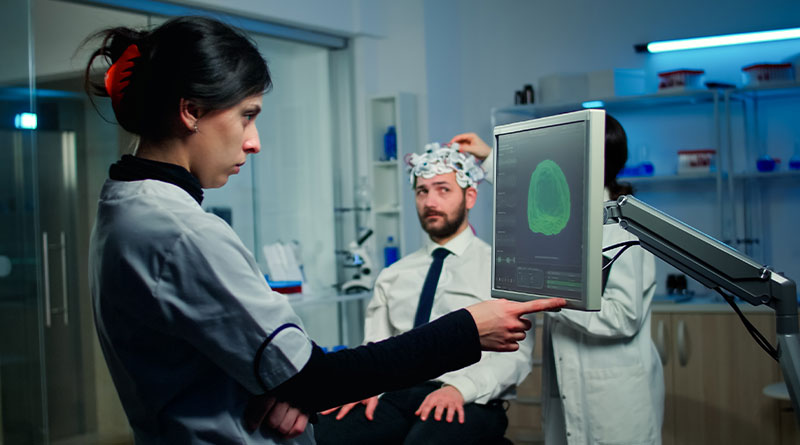Mental health disorders such as depression and anxiety affect millions of people worldwide and can have a significant impact on their quality of life. While traditional treatments such as medication and therapy are effective for many patients, there are some who do not respond to these treatments.
Transcranial Magnetic Stimulation (TMS) therapy is a non-invasive and safe treatment option that has been found to be effective for patients with treatment-resistant depression and other mood disorders.
In this comprehensive review, we will discuss the benefits of TMS therapy and how it can be a game-changer for those seeking relief from their symptoms.
What is TMS Therapy?
Transcranial Magnetic Stimulation (TMS) therapy is a non-invasive and painless treatment method that uses magnetic fields to stimulate nerve cells in the brain. The procedure involves placing a coil on the scalp, which sends magnetic pulses to the brain. Magnetic stimulation helps to improve the communication between nerve cells in the brain, which can lead to a reduction in symptoms of depression and anxiety.
TMS therapy is typically administered in an outpatient setting and does not require any anesthesia or sedation. The procedure is considered safe and has fewer side effects compared to traditional treatments such as medications and electroconvulsive therapy (ECT).
TMS therapy is an effective treatment option for patients with treatment-resistant depression and other mood disorders.
Benefits of TMS Therapy
Non-Invasive and Safe
Transcranial Magnetic Stimulation (TMS) therapy is a non-invasive and safe treatment option for patients suffering from depression and anxiety. Unlike traditional treatments, TMS therapy does not require any anesthesia or sedation, making it a less stressful and more comfortable experience for patients.
TMS therapy also has fewer side effects compared to other treatments such as electroconvulsive therapy (ECT) and medication. The procedure is considered safe and does not cause any memory loss, a common side effect of ECT.
Effective Treatment for Depression
TMS therapy is a highly effective treatment option for depression. Research has shown that TMS therapy can significantly improve symptoms of depression in patients who have not responded to other treatments such as medication and therapy. The therapy has also been found to be effective in reducing symptoms of depression in patients with treatment-resistant depression.
Moreover, TMS therapy has long-lasting results, providing patients with significant relief even after the completion of treatment.
Fewer Side Effects
TMS therapy has fewer side effects compared to traditional treatments for depression and anxiety. Unlike medications, TMS therapy does not cause any systemic side effects such as weight gain, sexual dysfunction, or nausea. The most common side effect of TMS therapy is mild to moderate scalp discomfort, which typically subsides after the first few sessions.
The fact that TMS therapy has fewer side effects compared to traditional treatments is a major advantage. Medications used to treat depression and anxiety often have numerous side effects that can interfere with daily life. TMS therapy, on the other hand, does not have these systemic side effects, making it a much more tolerable treatment option for many patients.
Quick and Convenient
TMS therapy provides a fast and convenient treatment option for patients. Each session typically lasts between 20-30 minutes, and patients can resume their daily activities immediately after the session. TMS therapy also requires no hospitalization, allowing patients to receive treatment in an outpatient setting.
The convenience of TMS therapy is another significant benefit. Patients can typically fit TMS therapy sessions into their busy schedules without disrupting their daily routines. As an outpatient procedure, it is an excellent option for those who cannot afford to take time off work or school.
Long-Lasting Results
TMS therapy has been shown to provide long-lasting results. Many patients experience a significant reduction in symptoms of depression and anxiety even after the completion of treatment. In some cases, patients may require maintenance sessions to maintain the benefits of TMS therapy.
The long-lasting effects of TMS therapy are what make it a particularly effective treatment option for patients with depression and anxiety. Unlike traditional treatments that only provide temporary relief, TMS therapy has been shown to provide lasting improvement in symptoms. Patients who have undergone TMS therapy have reported feeling happier, more energized, and more positive overall.
Treatment for Multiple Disorders
TMS therapy is not limited to treating depression and anxiety. It has also been found to be effective in the treatment of other mood disorders such as bipolar disorder and obsessive-compulsive disorder (OCD). TMS therapy is also being studied as a potential treatment for other conditions such as chronic pain, tinnitus, and addiction.
With its broad potential uses, TMS therapy has the potential to be a groundbreaking treatment for various disorders.
Safe for Pregnant Women
TMS therapy is considered safe for pregnant women. Unlike medications, which can have adverse effects on the developing fetus, TMS therapy does not have any known harmful effects on the fetus. However, pregnant women should always consult with their healthcare provider before starting any new treatment, even if it is considered safe.
It is important to note that TMS therapy should only be administered to pregnant women when the potential benefits outweigh the risks. For pregnant women with a history of depression and anxiety, TMS therapy could potentially be a preventive measure for postpartum depression.
Customizable Treatment
TMS therapy is a customizable treatment. The frequency and duration of the sessions can be adjusted based on the patient’s needs. The treatment can also be targeted to specific areas of the brain, allowing for personalized treatment. With its customizable options, TMS therapy provides patients with a more tailored and effective treatment option, improving their chances of success.
Moreover, the customization of TMS therapy also allows for a more efficient treatment process. By targeting specific areas of the brain, TMS therapy can be more effective in treating certain symptoms of depression and anxiety. The frequency and duration of TMS therapy sessions can be adjusted to fit the patient’s schedule and individual needs, making it a flexible and convenient option for many.
Conclusion
TMS therapy is a non-invasive and safe treatment option for depression, anxiety, and other mood disorders. It has been found to be effective in patients who have not responded to other treatments such as medication and therapy. TMS therapy has fewer side effects compared to traditional treatments and provides long-lasting results. It is a quick and convenient treatment option that can be customized to meet the patient’s needs. TMS therapy is also being studied as a potential treatment for other conditions.
If you or someone you know is suffering from depression, anxiety, or another mood disorder, TMS therapy may be a game-changer and provide the relief needed to improve their quality of life.
Sahil Sachdeva is the Founder of curemedoc.com and a Digital Marketing professional with 6+ years of experience. If you need help in Content writing and want to increase your website ranking, connect with him, as he has some premium websites where you can share blogs with DoFollow links and increase your website’s ranking on Google.





